Exploring the Impact: Does Globalization Really Cause Poverty?
VerifiedAdded on 2023/06/11
|8
|2234
|268
Essay
AI Summary
This essay delves into the multifaceted debate on whether globalization causes poverty, examining various perspectives and arguments. It acknowledges the contrasting views that globalization intensifies competition for the poor while also potentially strengthening their position. The analysis highlights the rising gap between the rich and poor, attributing it to factors such as increased foreign trade, uneven development, and the exploitation of developing nations by wealthier countries. The essay also considers contradictory viewpoints, noting that some argue globalization reduces poverty by fostering economic growth and integration. It further discusses how globalization can expose the poor to harmful competition and technological disparities, ultimately suggesting that effective government policies are crucial for leveraging globalization to reduce poverty. The conclusion emphasizes that globalization's impact varies across countries, depending on their specific economic and political circumstances, and that its success hinges on ensuring inclusivity and equitable participation.
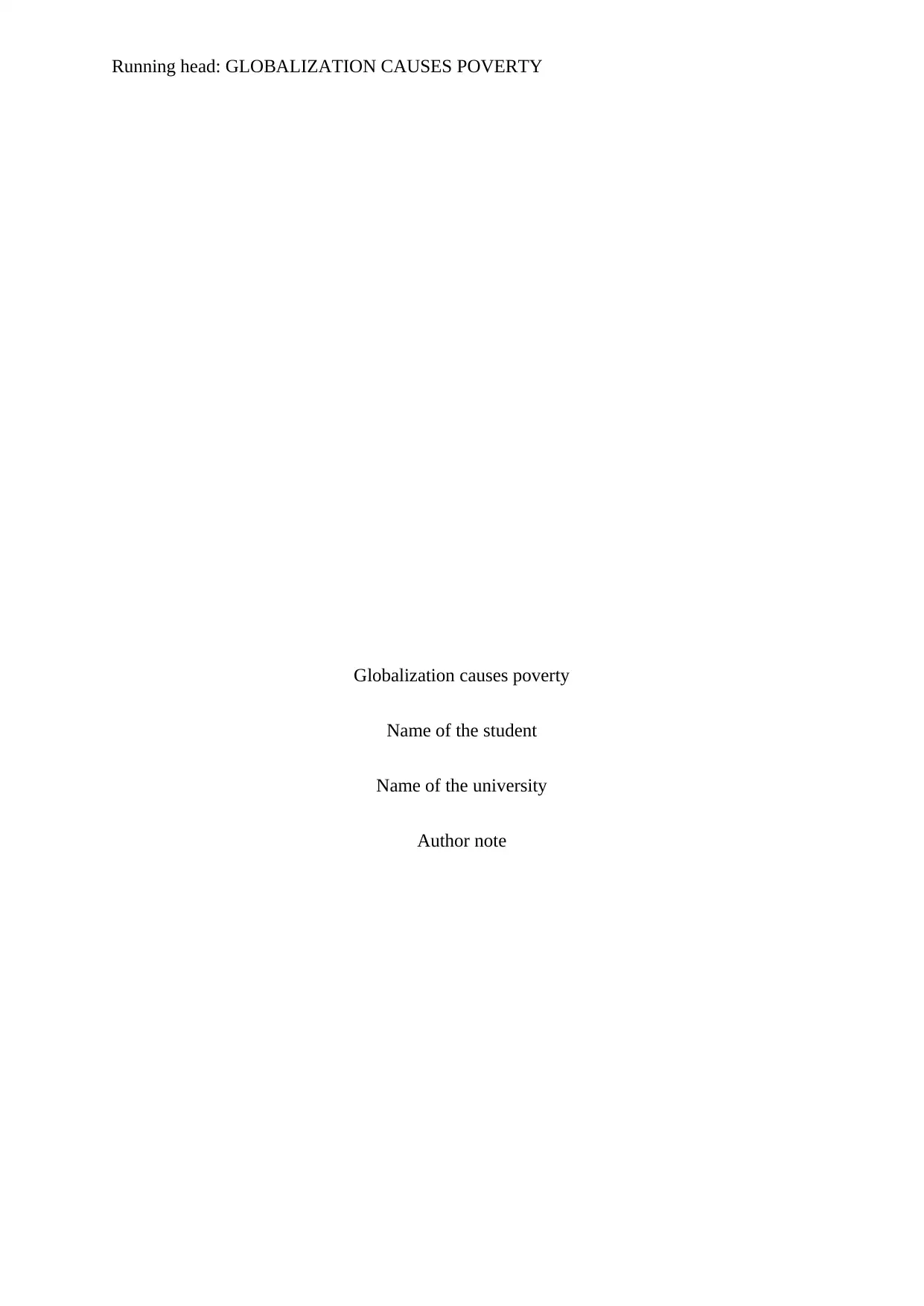
Running head: GLOBALIZATION CAUSES POVERTY
Globalization causes poverty
Name of the student
Name of the university
Author note
Globalization causes poverty
Name of the student
Name of the university
Author note
Paraphrase This Document
Need a fresh take? Get an instant paraphrase of this document with our AI Paraphraser
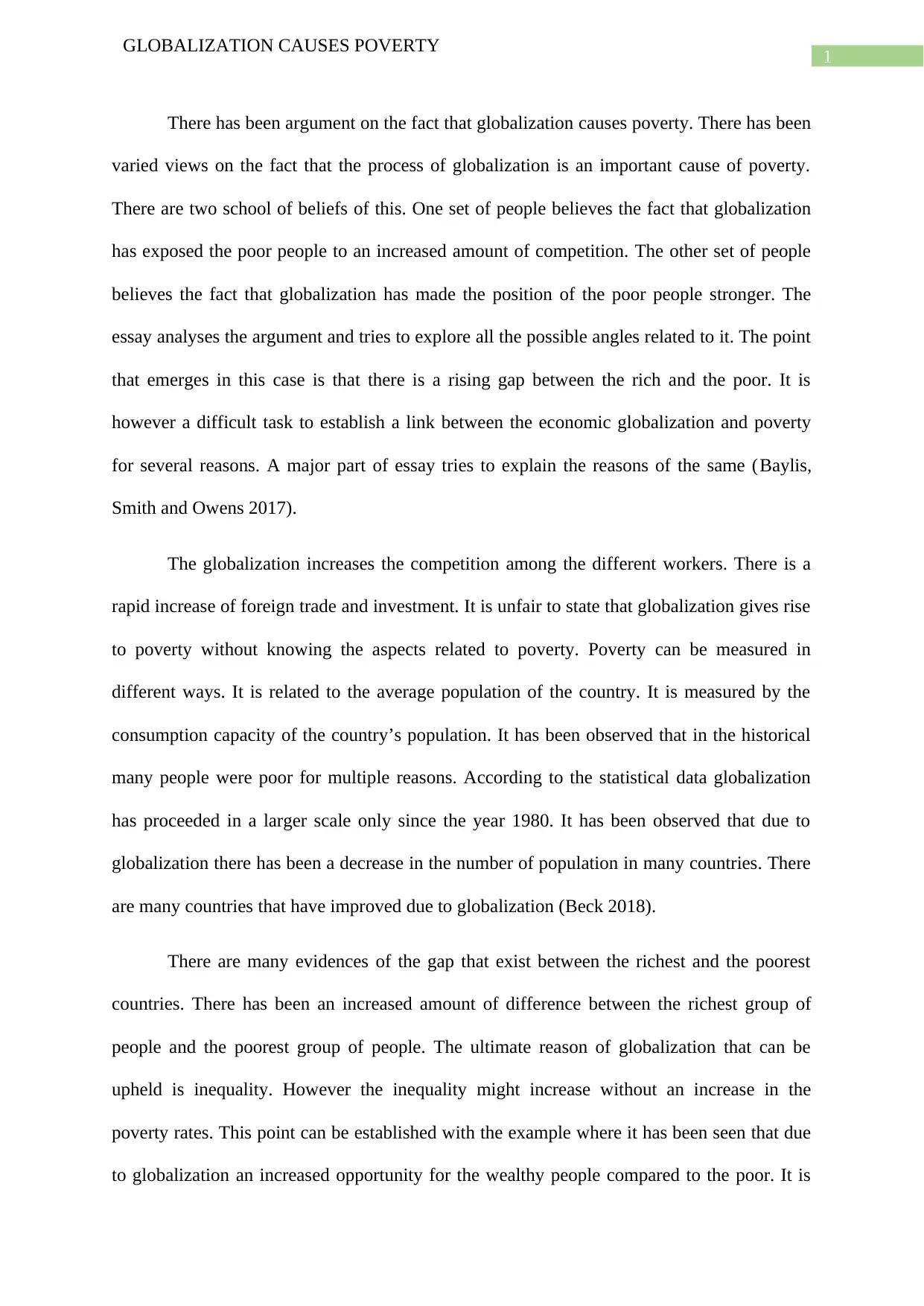
1
GLOBALIZATION CAUSES POVERTY
There has been argument on the fact that globalization causes poverty. There has been
varied views on the fact that the process of globalization is an important cause of poverty.
There are two school of beliefs of this. One set of people believes the fact that globalization
has exposed the poor people to an increased amount of competition. The other set of people
believes the fact that globalization has made the position of the poor people stronger. The
essay analyses the argument and tries to explore all the possible angles related to it. The point
that emerges in this case is that there is a rising gap between the rich and the poor. It is
however a difficult task to establish a link between the economic globalization and poverty
for several reasons. A major part of essay tries to explain the reasons of the same (Baylis,
Smith and Owens 2017).
The globalization increases the competition among the different workers. There is a
rapid increase of foreign trade and investment. It is unfair to state that globalization gives rise
to poverty without knowing the aspects related to poverty. Poverty can be measured in
different ways. It is related to the average population of the country. It is measured by the
consumption capacity of the country’s population. It has been observed that in the historical
many people were poor for multiple reasons. According to the statistical data globalization
has proceeded in a larger scale only since the year 1980. It has been observed that due to
globalization there has been a decrease in the number of population in many countries. There
are many countries that have improved due to globalization (Beck 2018).
There are many evidences of the gap that exist between the richest and the poorest
countries. There has been an increased amount of difference between the richest group of
people and the poorest group of people. The ultimate reason of globalization that can be
upheld is inequality. However the inequality might increase without an increase in the
poverty rates. This point can be established with the example where it has been seen that due
to globalization an increased opportunity for the wealthy people compared to the poor. It is
GLOBALIZATION CAUSES POVERTY
There has been argument on the fact that globalization causes poverty. There has been
varied views on the fact that the process of globalization is an important cause of poverty.
There are two school of beliefs of this. One set of people believes the fact that globalization
has exposed the poor people to an increased amount of competition. The other set of people
believes the fact that globalization has made the position of the poor people stronger. The
essay analyses the argument and tries to explore all the possible angles related to it. The point
that emerges in this case is that there is a rising gap between the rich and the poor. It is
however a difficult task to establish a link between the economic globalization and poverty
for several reasons. A major part of essay tries to explain the reasons of the same (Baylis,
Smith and Owens 2017).
The globalization increases the competition among the different workers. There is a
rapid increase of foreign trade and investment. It is unfair to state that globalization gives rise
to poverty without knowing the aspects related to poverty. Poverty can be measured in
different ways. It is related to the average population of the country. It is measured by the
consumption capacity of the country’s population. It has been observed that in the historical
many people were poor for multiple reasons. According to the statistical data globalization
has proceeded in a larger scale only since the year 1980. It has been observed that due to
globalization there has been a decrease in the number of population in many countries. There
are many countries that have improved due to globalization (Beck 2018).
There are many evidences of the gap that exist between the richest and the poorest
countries. There has been an increased amount of difference between the richest group of
people and the poorest group of people. The ultimate reason of globalization that can be
upheld is inequality. However the inequality might increase without an increase in the
poverty rates. This point can be established with the example where it has been seen that due
to globalization an increased opportunity for the wealthy people compared to the poor. It is
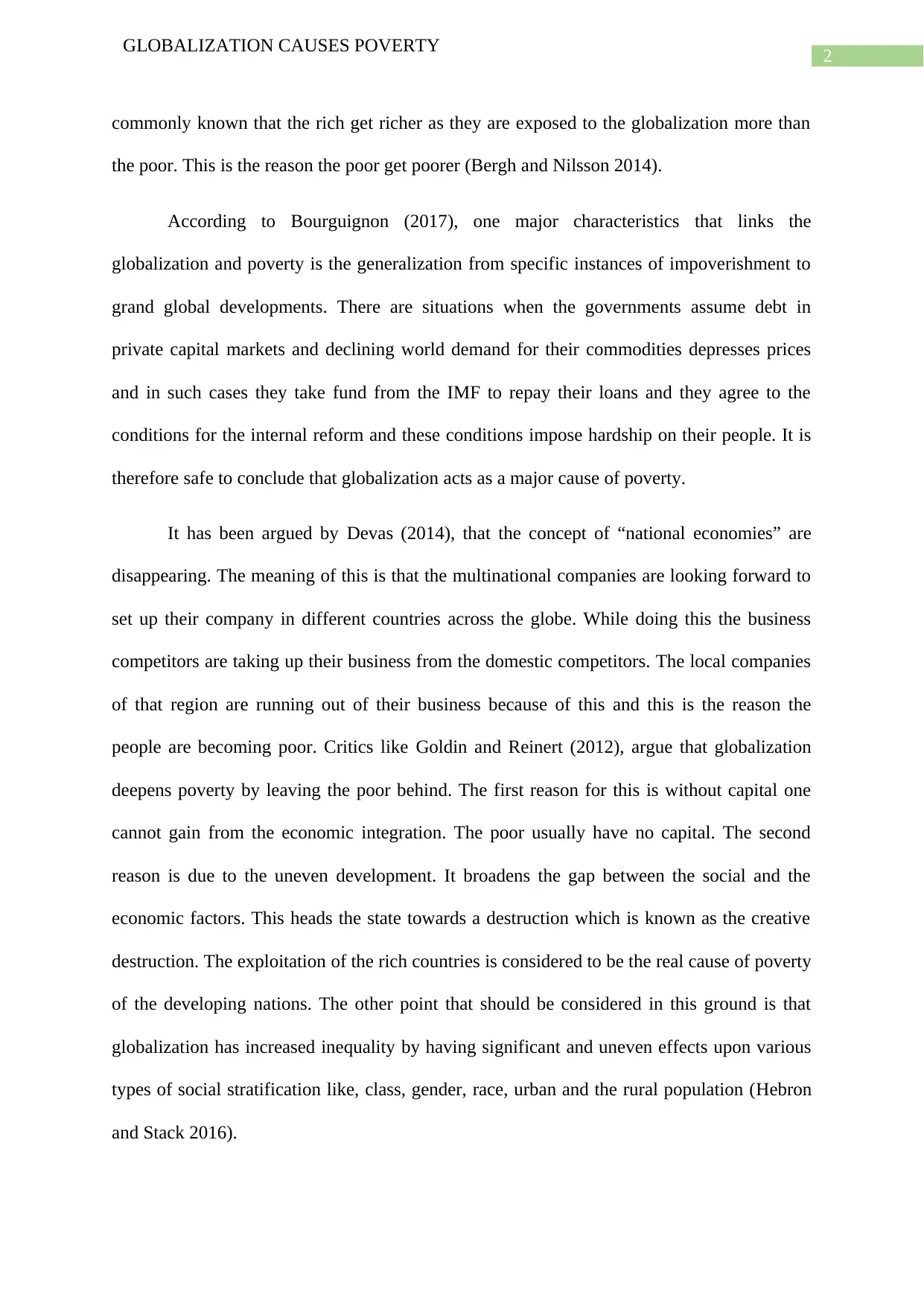
2
GLOBALIZATION CAUSES POVERTY
commonly known that the rich get richer as they are exposed to the globalization more than
the poor. This is the reason the poor get poorer (Bergh and Nilsson 2014).
According to Bourguignon (2017), one major characteristics that links the
globalization and poverty is the generalization from specific instances of impoverishment to
grand global developments. There are situations when the governments assume debt in
private capital markets and declining world demand for their commodities depresses prices
and in such cases they take fund from the IMF to repay their loans and they agree to the
conditions for the internal reform and these conditions impose hardship on their people. It is
therefore safe to conclude that globalization acts as a major cause of poverty.
It has been argued by Devas (2014), that the concept of “national economies” are
disappearing. The meaning of this is that the multinational companies are looking forward to
set up their company in different countries across the globe. While doing this the business
competitors are taking up their business from the domestic competitors. The local companies
of that region are running out of their business because of this and this is the reason the
people are becoming poor. Critics like Goldin and Reinert (2012), argue that globalization
deepens poverty by leaving the poor behind. The first reason for this is without capital one
cannot gain from the economic integration. The poor usually have no capital. The second
reason is due to the uneven development. It broadens the gap between the social and the
economic factors. This heads the state towards a destruction which is known as the creative
destruction. The exploitation of the rich countries is considered to be the real cause of poverty
of the developing nations. The other point that should be considered in this ground is that
globalization has increased inequality by having significant and uneven effects upon various
types of social stratification like, class, gender, race, urban and the rural population (Hebron
and Stack 2016).
GLOBALIZATION CAUSES POVERTY
commonly known that the rich get richer as they are exposed to the globalization more than
the poor. This is the reason the poor get poorer (Bergh and Nilsson 2014).
According to Bourguignon (2017), one major characteristics that links the
globalization and poverty is the generalization from specific instances of impoverishment to
grand global developments. There are situations when the governments assume debt in
private capital markets and declining world demand for their commodities depresses prices
and in such cases they take fund from the IMF to repay their loans and they agree to the
conditions for the internal reform and these conditions impose hardship on their people. It is
therefore safe to conclude that globalization acts as a major cause of poverty.
It has been argued by Devas (2014), that the concept of “national economies” are
disappearing. The meaning of this is that the multinational companies are looking forward to
set up their company in different countries across the globe. While doing this the business
competitors are taking up their business from the domestic competitors. The local companies
of that region are running out of their business because of this and this is the reason the
people are becoming poor. Critics like Goldin and Reinert (2012), argue that globalization
deepens poverty by leaving the poor behind. The first reason for this is without capital one
cannot gain from the economic integration. The poor usually have no capital. The second
reason is due to the uneven development. It broadens the gap between the social and the
economic factors. This heads the state towards a destruction which is known as the creative
destruction. The exploitation of the rich countries is considered to be the real cause of poverty
of the developing nations. The other point that should be considered in this ground is that
globalization has increased inequality by having significant and uneven effects upon various
types of social stratification like, class, gender, race, urban and the rural population (Hebron
and Stack 2016).
⊘ This is a preview!⊘
Do you want full access?
Subscribe today to unlock all pages.

Trusted by 1+ million students worldwide
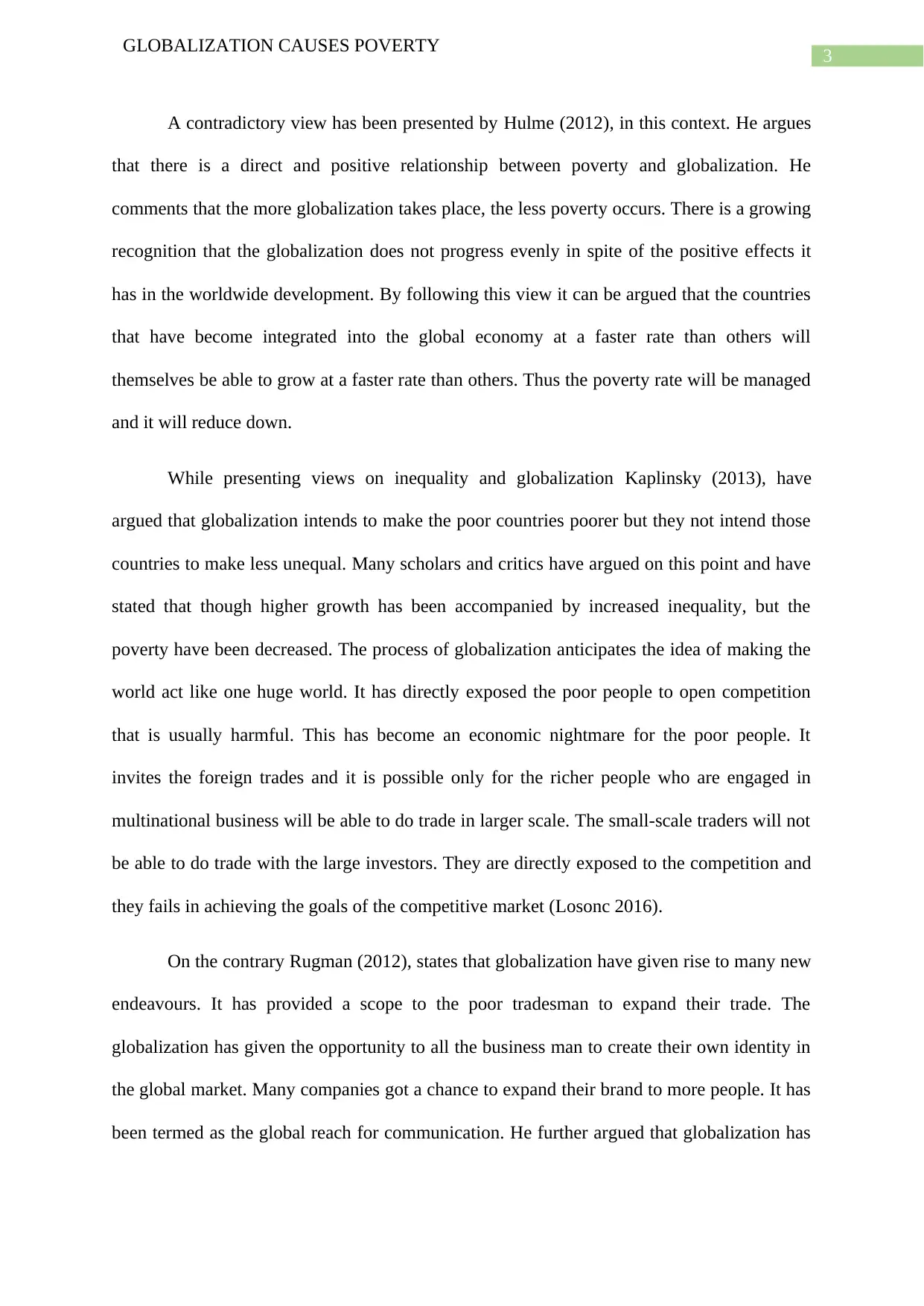
3
GLOBALIZATION CAUSES POVERTY
A contradictory view has been presented by Hulme (2012), in this context. He argues
that there is a direct and positive relationship between poverty and globalization. He
comments that the more globalization takes place, the less poverty occurs. There is a growing
recognition that the globalization does not progress evenly in spite of the positive effects it
has in the worldwide development. By following this view it can be argued that the countries
that have become integrated into the global economy at a faster rate than others will
themselves be able to grow at a faster rate than others. Thus the poverty rate will be managed
and it will reduce down.
While presenting views on inequality and globalization Kaplinsky (2013), have
argued that globalization intends to make the poor countries poorer but they not intend those
countries to make less unequal. Many scholars and critics have argued on this point and have
stated that though higher growth has been accompanied by increased inequality, but the
poverty have been decreased. The process of globalization anticipates the idea of making the
world act like one huge world. It has directly exposed the poor people to open competition
that is usually harmful. This has become an economic nightmare for the poor people. It
invites the foreign trades and it is possible only for the richer people who are engaged in
multinational business will be able to do trade in larger scale. The small-scale traders will not
be able to do trade with the large investors. They are directly exposed to the competition and
they fails in achieving the goals of the competitive market (Losonc 2016).
On the contrary Rugman (2012), states that globalization have given rise to many new
endeavours. It has provided a scope to the poor tradesman to expand their trade. The
globalization has given the opportunity to all the business man to create their own identity in
the global market. Many companies got a chance to expand their brand to more people. It has
been termed as the global reach for communication. He further argued that globalization has
GLOBALIZATION CAUSES POVERTY
A contradictory view has been presented by Hulme (2012), in this context. He argues
that there is a direct and positive relationship between poverty and globalization. He
comments that the more globalization takes place, the less poverty occurs. There is a growing
recognition that the globalization does not progress evenly in spite of the positive effects it
has in the worldwide development. By following this view it can be argued that the countries
that have become integrated into the global economy at a faster rate than others will
themselves be able to grow at a faster rate than others. Thus the poverty rate will be managed
and it will reduce down.
While presenting views on inequality and globalization Kaplinsky (2013), have
argued that globalization intends to make the poor countries poorer but they not intend those
countries to make less unequal. Many scholars and critics have argued on this point and have
stated that though higher growth has been accompanied by increased inequality, but the
poverty have been decreased. The process of globalization anticipates the idea of making the
world act like one huge world. It has directly exposed the poor people to open competition
that is usually harmful. This has become an economic nightmare for the poor people. It
invites the foreign trades and it is possible only for the richer people who are engaged in
multinational business will be able to do trade in larger scale. The small-scale traders will not
be able to do trade with the large investors. They are directly exposed to the competition and
they fails in achieving the goals of the competitive market (Losonc 2016).
On the contrary Rugman (2012), states that globalization have given rise to many new
endeavours. It has provided a scope to the poor tradesman to expand their trade. The
globalization has given the opportunity to all the business man to create their own identity in
the global market. Many companies got a chance to expand their brand to more people. It has
been termed as the global reach for communication. He further argued that globalization has
Paraphrase This Document
Need a fresh take? Get an instant paraphrase of this document with our AI Paraphraser
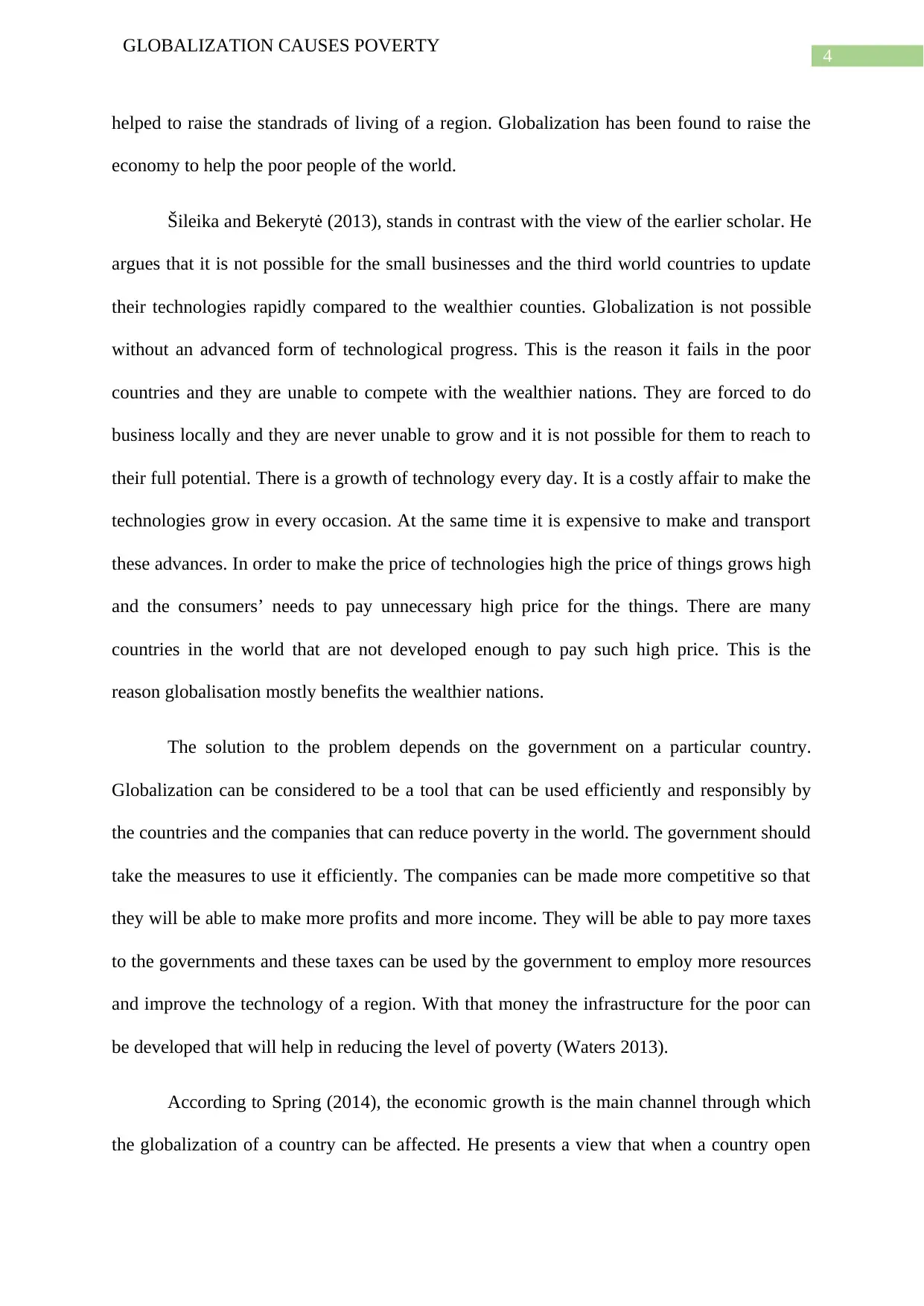
4
GLOBALIZATION CAUSES POVERTY
helped to raise the standrads of living of a region. Globalization has been found to raise the
economy to help the poor people of the world.
Šileika and Bekerytė (2013), stands in contrast with the view of the earlier scholar. He
argues that it is not possible for the small businesses and the third world countries to update
their technologies rapidly compared to the wealthier counties. Globalization is not possible
without an advanced form of technological progress. This is the reason it fails in the poor
countries and they are unable to compete with the wealthier nations. They are forced to do
business locally and they are never unable to grow and it is not possible for them to reach to
their full potential. There is a growth of technology every day. It is a costly affair to make the
technologies grow in every occasion. At the same time it is expensive to make and transport
these advances. In order to make the price of technologies high the price of things grows high
and the consumers’ needs to pay unnecessary high price for the things. There are many
countries in the world that are not developed enough to pay such high price. This is the
reason globalisation mostly benefits the wealthier nations.
The solution to the problem depends on the government on a particular country.
Globalization can be considered to be a tool that can be used efficiently and responsibly by
the countries and the companies that can reduce poverty in the world. The government should
take the measures to use it efficiently. The companies can be made more competitive so that
they will be able to make more profits and more income. They will be able to pay more taxes
to the governments and these taxes can be used by the government to employ more resources
and improve the technology of a region. With that money the infrastructure for the poor can
be developed that will help in reducing the level of poverty (Waters 2013).
According to Spring (2014), the economic growth is the main channel through which
the globalization of a country can be affected. He presents a view that when a country open
GLOBALIZATION CAUSES POVERTY
helped to raise the standrads of living of a region. Globalization has been found to raise the
economy to help the poor people of the world.
Šileika and Bekerytė (2013), stands in contrast with the view of the earlier scholar. He
argues that it is not possible for the small businesses and the third world countries to update
their technologies rapidly compared to the wealthier counties. Globalization is not possible
without an advanced form of technological progress. This is the reason it fails in the poor
countries and they are unable to compete with the wealthier nations. They are forced to do
business locally and they are never unable to grow and it is not possible for them to reach to
their full potential. There is a growth of technology every day. It is a costly affair to make the
technologies grow in every occasion. At the same time it is expensive to make and transport
these advances. In order to make the price of technologies high the price of things grows high
and the consumers’ needs to pay unnecessary high price for the things. There are many
countries in the world that are not developed enough to pay such high price. This is the
reason globalisation mostly benefits the wealthier nations.
The solution to the problem depends on the government on a particular country.
Globalization can be considered to be a tool that can be used efficiently and responsibly by
the countries and the companies that can reduce poverty in the world. The government should
take the measures to use it efficiently. The companies can be made more competitive so that
they will be able to make more profits and more income. They will be able to pay more taxes
to the governments and these taxes can be used by the government to employ more resources
and improve the technology of a region. With that money the infrastructure for the poor can
be developed that will help in reducing the level of poverty (Waters 2013).
According to Spring (2014), the economic growth is the main channel through which
the globalization of a country can be affected. He presents a view that when a country open
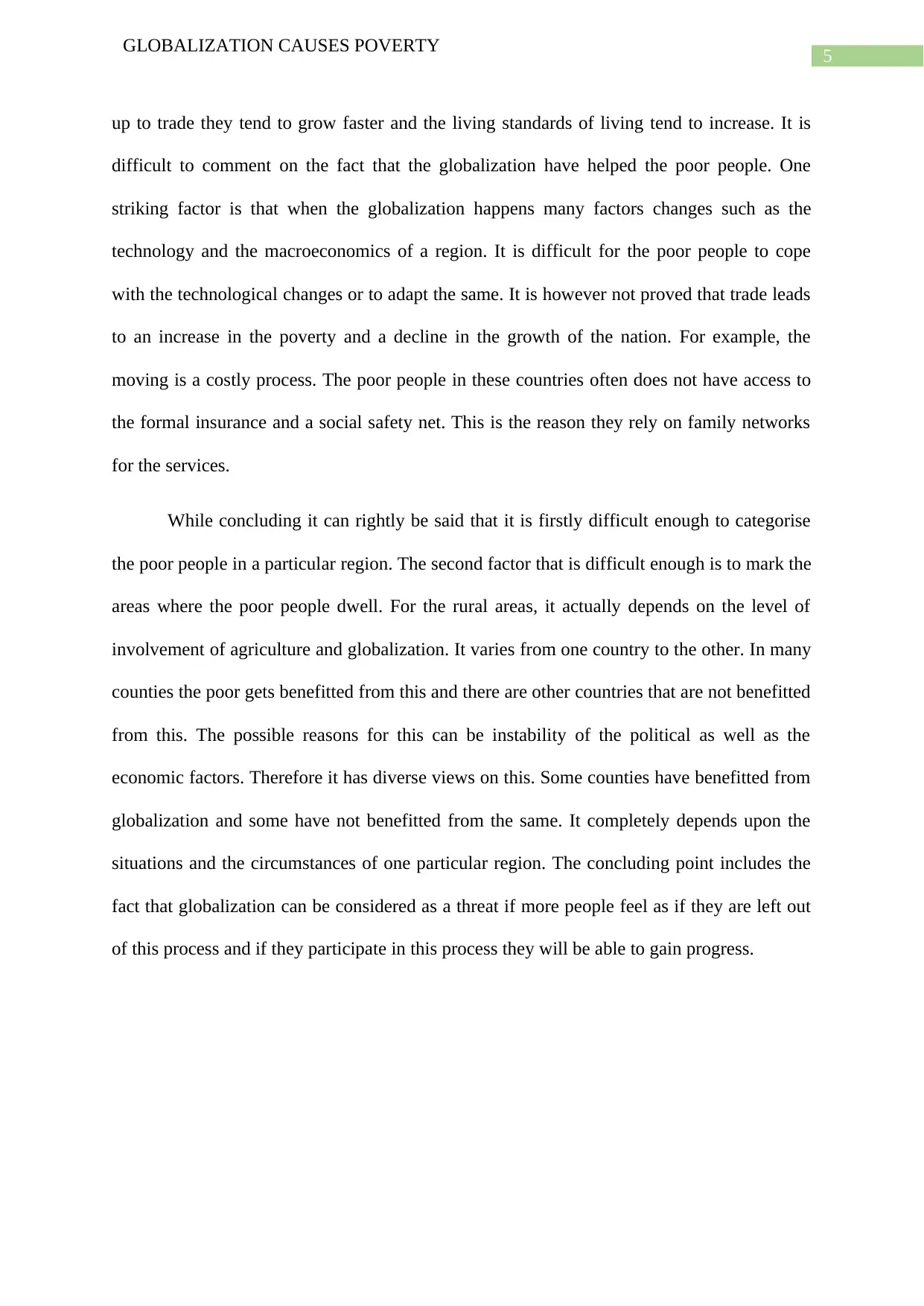
5
GLOBALIZATION CAUSES POVERTY
up to trade they tend to grow faster and the living standards of living tend to increase. It is
difficult to comment on the fact that the globalization have helped the poor people. One
striking factor is that when the globalization happens many factors changes such as the
technology and the macroeconomics of a region. It is difficult for the poor people to cope
with the technological changes or to adapt the same. It is however not proved that trade leads
to an increase in the poverty and a decline in the growth of the nation. For example, the
moving is a costly process. The poor people in these countries often does not have access to
the formal insurance and a social safety net. This is the reason they rely on family networks
for the services.
While concluding it can rightly be said that it is firstly difficult enough to categorise
the poor people in a particular region. The second factor that is difficult enough is to mark the
areas where the poor people dwell. For the rural areas, it actually depends on the level of
involvement of agriculture and globalization. It varies from one country to the other. In many
counties the poor gets benefitted from this and there are other countries that are not benefitted
from this. The possible reasons for this can be instability of the political as well as the
economic factors. Therefore it has diverse views on this. Some counties have benefitted from
globalization and some have not benefitted from the same. It completely depends upon the
situations and the circumstances of one particular region. The concluding point includes the
fact that globalization can be considered as a threat if more people feel as if they are left out
of this process and if they participate in this process they will be able to gain progress.
GLOBALIZATION CAUSES POVERTY
up to trade they tend to grow faster and the living standards of living tend to increase. It is
difficult to comment on the fact that the globalization have helped the poor people. One
striking factor is that when the globalization happens many factors changes such as the
technology and the macroeconomics of a region. It is difficult for the poor people to cope
with the technological changes or to adapt the same. It is however not proved that trade leads
to an increase in the poverty and a decline in the growth of the nation. For example, the
moving is a costly process. The poor people in these countries often does not have access to
the formal insurance and a social safety net. This is the reason they rely on family networks
for the services.
While concluding it can rightly be said that it is firstly difficult enough to categorise
the poor people in a particular region. The second factor that is difficult enough is to mark the
areas where the poor people dwell. For the rural areas, it actually depends on the level of
involvement of agriculture and globalization. It varies from one country to the other. In many
counties the poor gets benefitted from this and there are other countries that are not benefitted
from this. The possible reasons for this can be instability of the political as well as the
economic factors. Therefore it has diverse views on this. Some counties have benefitted from
globalization and some have not benefitted from the same. It completely depends upon the
situations and the circumstances of one particular region. The concluding point includes the
fact that globalization can be considered as a threat if more people feel as if they are left out
of this process and if they participate in this process they will be able to gain progress.
⊘ This is a preview!⊘
Do you want full access?
Subscribe today to unlock all pages.

Trusted by 1+ million students worldwide
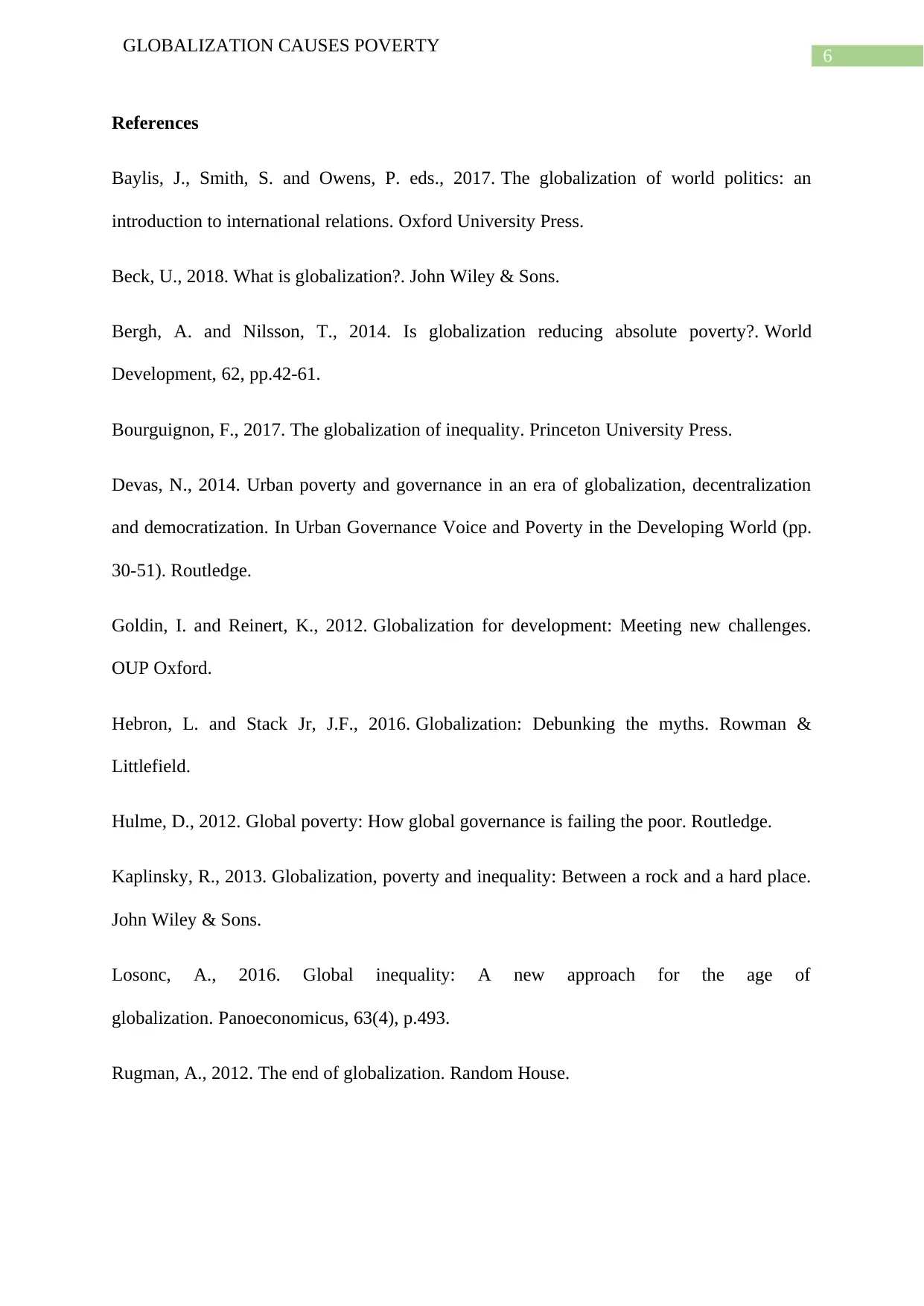
6
GLOBALIZATION CAUSES POVERTY
References
Baylis, J., Smith, S. and Owens, P. eds., 2017. The globalization of world politics: an
introduction to international relations. Oxford University Press.
Beck, U., 2018. What is globalization?. John Wiley & Sons.
Bergh, A. and Nilsson, T., 2014. Is globalization reducing absolute poverty?. World
Development, 62, pp.42-61.
Bourguignon, F., 2017. The globalization of inequality. Princeton University Press.
Devas, N., 2014. Urban poverty and governance in an era of globalization, decentralization
and democratization. In Urban Governance Voice and Poverty in the Developing World (pp.
30-51). Routledge.
Goldin, I. and Reinert, K., 2012. Globalization for development: Meeting new challenges.
OUP Oxford.
Hebron, L. and Stack Jr, J.F., 2016. Globalization: Debunking the myths. Rowman &
Littlefield.
Hulme, D., 2012. Global poverty: How global governance is failing the poor. Routledge.
Kaplinsky, R., 2013. Globalization, poverty and inequality: Between a rock and a hard place.
John Wiley & Sons.
Losonc, A., 2016. Global inequality: A new approach for the age of
globalization. Panoeconomicus, 63(4), p.493.
Rugman, A., 2012. The end of globalization. Random House.
GLOBALIZATION CAUSES POVERTY
References
Baylis, J., Smith, S. and Owens, P. eds., 2017. The globalization of world politics: an
introduction to international relations. Oxford University Press.
Beck, U., 2018. What is globalization?. John Wiley & Sons.
Bergh, A. and Nilsson, T., 2014. Is globalization reducing absolute poverty?. World
Development, 62, pp.42-61.
Bourguignon, F., 2017. The globalization of inequality. Princeton University Press.
Devas, N., 2014. Urban poverty and governance in an era of globalization, decentralization
and democratization. In Urban Governance Voice and Poverty in the Developing World (pp.
30-51). Routledge.
Goldin, I. and Reinert, K., 2012. Globalization for development: Meeting new challenges.
OUP Oxford.
Hebron, L. and Stack Jr, J.F., 2016. Globalization: Debunking the myths. Rowman &
Littlefield.
Hulme, D., 2012. Global poverty: How global governance is failing the poor. Routledge.
Kaplinsky, R., 2013. Globalization, poverty and inequality: Between a rock and a hard place.
John Wiley & Sons.
Losonc, A., 2016. Global inequality: A new approach for the age of
globalization. Panoeconomicus, 63(4), p.493.
Rugman, A., 2012. The end of globalization. Random House.
Paraphrase This Document
Need a fresh take? Get an instant paraphrase of this document with our AI Paraphraser
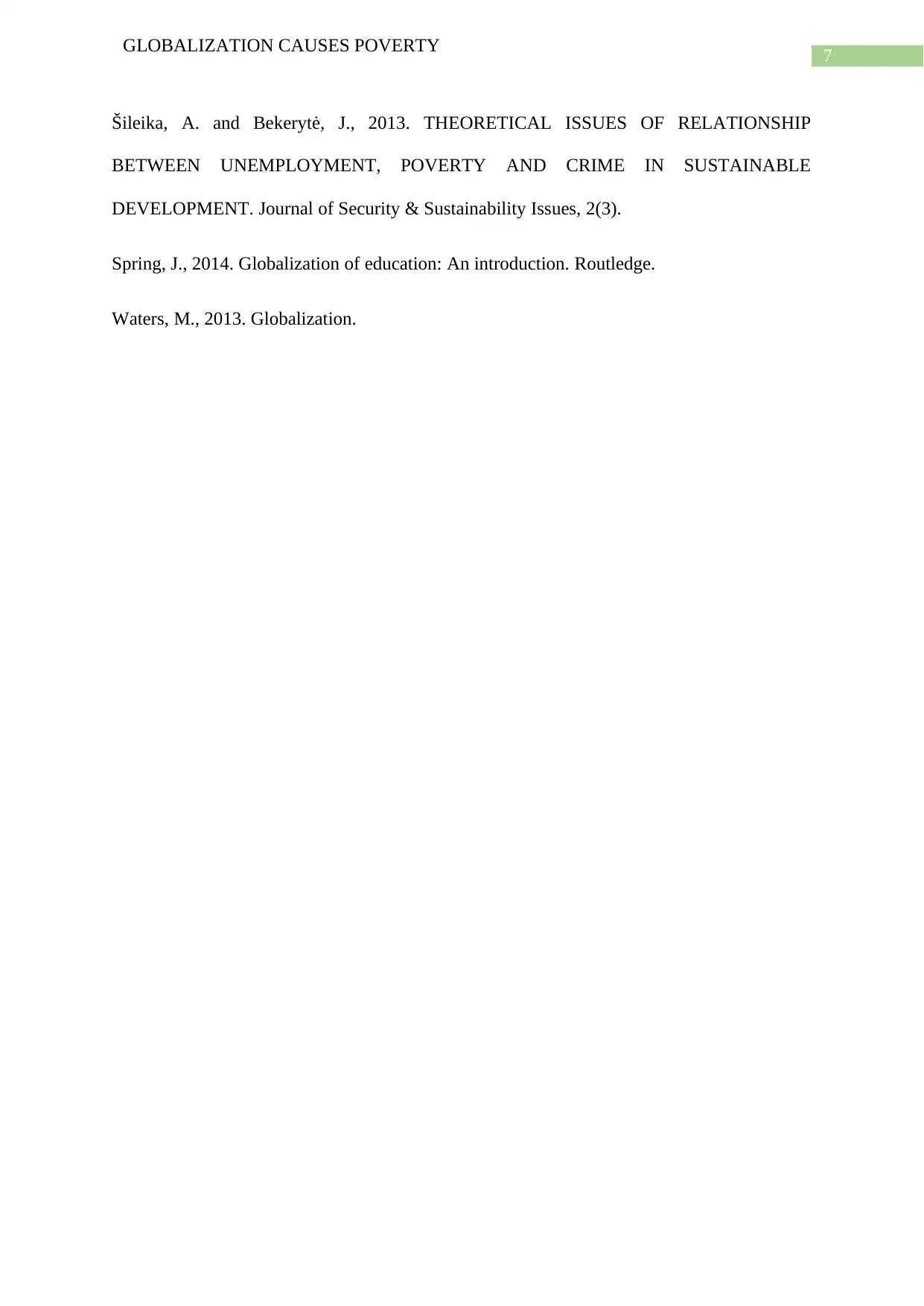
7
GLOBALIZATION CAUSES POVERTY
Šileika, A. and Bekerytė, J., 2013. THEORETICAL ISSUES OF RELATIONSHIP
BETWEEN UNEMPLOYMENT, POVERTY AND CRIME IN SUSTAINABLE
DEVELOPMENT. Journal of Security & Sustainability Issues, 2(3).
Spring, J., 2014. Globalization of education: An introduction. Routledge.
Waters, M., 2013. Globalization.
GLOBALIZATION CAUSES POVERTY
Šileika, A. and Bekerytė, J., 2013. THEORETICAL ISSUES OF RELATIONSHIP
BETWEEN UNEMPLOYMENT, POVERTY AND CRIME IN SUSTAINABLE
DEVELOPMENT. Journal of Security & Sustainability Issues, 2(3).
Spring, J., 2014. Globalization of education: An introduction. Routledge.
Waters, M., 2013. Globalization.
1 out of 8
Related Documents
Your All-in-One AI-Powered Toolkit for Academic Success.
+13062052269
info@desklib.com
Available 24*7 on WhatsApp / Email
![[object Object]](/_next/static/media/star-bottom.7253800d.svg)
Unlock your academic potential
Copyright © 2020–2026 A2Z Services. All Rights Reserved. Developed and managed by ZUCOL.





